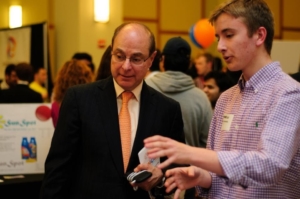‘A MUCH MORE ROBUST DISCUSSION’
Connolly’s internship-closing project “took into account the costs of new laptops and fixing them, and the downtime associated with that. From that project, I proposed that Amazon change its procurement policy,” he says. “Employees were given laptops every four years, but through my project I showed that it would be cheaper to give them new laptops every three years. I presented that to my manager and it actually ended up getting incorporated into a report that went up to Amazon CEO Jeff Bezos, and now they have changed the laptop procurement policy as a result of that project.”
On the final day of his co-op, Connolly had a meeting with his direct manager and was offered a full-time job at Amazon after graduation. When Connolly returned to Northeastern for his final year of classes, he applauded the co-op model.
“When you go back to class and you have peers that have all worked at 25-30 different co-ops whose employers all operate differently and you compare that to the textbook way of doing things, you have a much more robust discussion,” Connolly says. “Amazon does not go by the textbook way and it was helpful to get other opinions about what newer companies are implementing.”
THE RESULTS ARE IN, AND BIZ LIKES THE CO-OP MODEL
Every Northeastern business student is expected to complete an experimential learning requirement, but co-op is not required but at the business school 92 percent of students opted to complete two co-ops prior to graduation and the curriculumis built around two co-ops.
Businesses like the co-op model, which may explain why so many other universities are using it, including Drexel University, Georgia Institute of Technology, Purdue University-West Lafayette, and Rochester Institute of Technology.
“Over the last several years one of the greatest benefits I have seen for employers who hire students at co-ops is the opportunity to convert those students to full-time hires before they even graduate,” Mary Kane says. “This has allowed employers to hire the top talent before they even begin their official ‘after graduation’ recruiting and beat out their competition for the best talent. In addition to being able to hire the best for their organization, they are also able to reduce their overall costs for full-time recruiting.”












Questions about this article? Email us or leave a comment below.